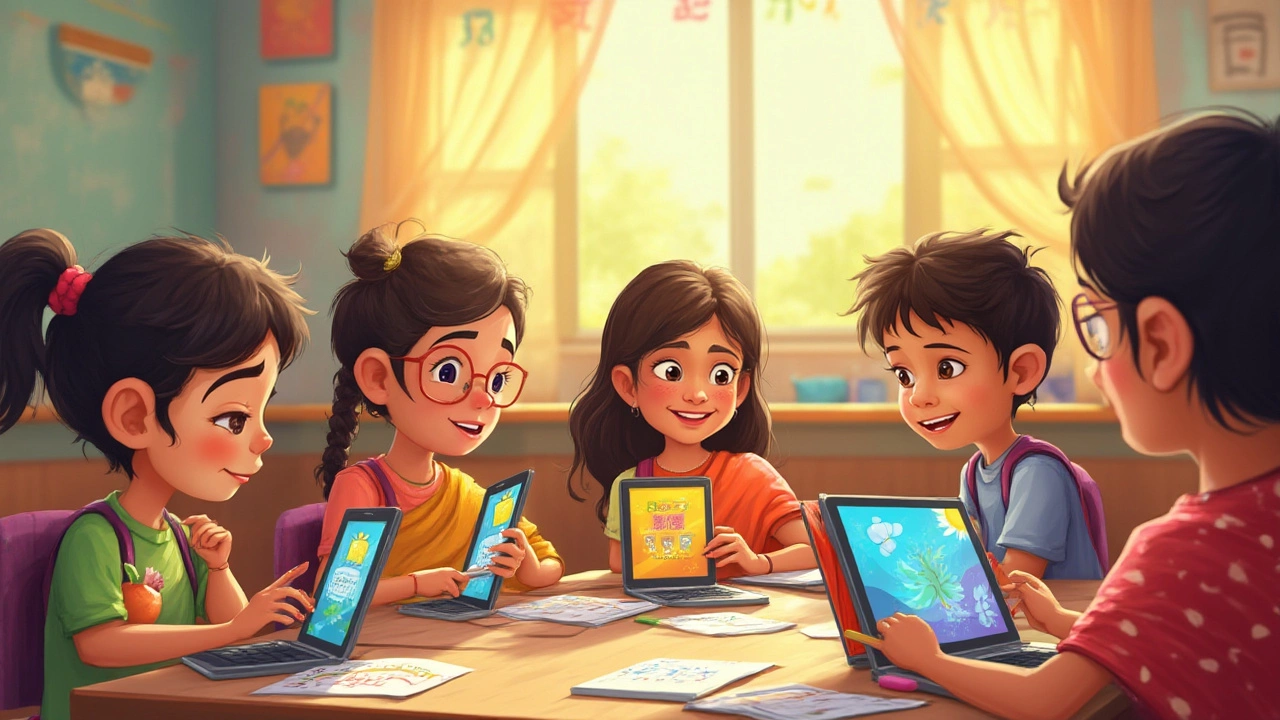Paywalls pop up everywhere now—just when you’re about to watch that crucial lesson or finish your practice test, bam! You’re asked for a credit card. The truth is, most educational apps parade as “free” but keep the essential stuff locked behind subscriptions. But hold up, if you dig deep enough, you’ll find diamonds: fully free educational apps that don’t hold back. Whether you're a parent wanting a no-surprises tool for your kid, a student prepping for tough entrance exams, or just a curious soul hungry to learn, you probably want answers: which educational app is truly, totally free?
Why “Free” Often Isn’t Free in Learning Apps
There’s a catch behind almost every “free download.” Most learning apps sneak in ads, extra paid features, or cap their resources after one or two lessons. It’s sneaky marketing. The reasons are obvious—developing an app, maintaining servers, creating new lessons, and hiring teachers isn’t cheap. That’s why barely 5% of educational apps on popular platforms like Google Play Store or Apple App Store are fully free. The other 95% either bait users with basics or keep advanced stuff behind paywalls.
Let me give you an example: Udemy shows tons of free courses, right? True, but most lead to a pay-to-unlock scenario after a demo video. Same with Byju’s and Unacademy—free to install, but anything substantial requires money. This often frustrates users who don’t realize until they waste time downloading and signing up. Even Duolingo, famous for its free model, has quietly shifted many advanced features and even simple practice drills into paid “Super Duolingo.” Apps like Vedantu or Toppr tease full courses, but only a handful are free—after that, you hit a locked chapter more often than not. So, how do you spot the rare, truly free learning app amid these gated gardens?
To help you compare, here’s a quick look at how “free” some popular apps really are:
| Educational App | Free Access? | Hidden Costs | Ad Intrusion |
|---|---|---|---|
| Duolingo | Yes (Basics) | Advanced tools locked | Moderate ads |
| Khan Academy | Yes (All) | None | No ads |
| Coursera | Yes (Some) | Most certifications paid | No ads |
| BYJU'S | No (Trial only) | Subscription for full content | None |
| Socratic | Yes (All) | None | No ads |
Khan Academy: The King of Free Learning
There’s no way around it—free educational app searches almost always land on Khan Academy. Why? It’s funded by donations instead of selling subscriptions or ads. Every course and lesson—Maths, Science, Computer Programming, History, Economics, SAT/ACT prep—is open without sign-up or payment. Seriously, no annoying pop-ups asking you to join “premium.” It’s like walking into an endless library where everything is up for grabs. Whether you’re helping your child understand multiplication before a big test or you want to brush up on statistics late at night, it just works.
Here’s a fun fact: Khan Academy’s videos have been translated into over 36 languages, and their platform has over 150 million users worldwide. Their Indian portal covers CBSE and state boards, so you can use it directly for your syllabus. Lesson videos are snappy and clear. Their mobile app syncs with your progress, so you can watch half a video on the bus and finish at your desk. Even their practice quizzes and simulated test papers are unlimited and don’t vanish after one use.
Tips for squeezing the most from Khan Academy:
- Set up a free child account for your kid—teachers/parents can track progress.
- Bookmark “Daily Challenges” to create a habit loop that keeps you coming back.
- Download videos for offline viewing—a lifesaver in parts of India with shaky mobile data.
- Try “Mastery Learning”: redo quizzes until you hit ‘mastered,’ not just completed.
Compare that to any major Indian player in ed-tech—you’ll spot the difference after the first login. There’s no selling, no cold calls, just a true open-source vibe. You can even donate if you want, but it’s never a requirement.
Other Totally Free Educational Apps For Every Age
While Khan Academy dominates, there’s a shortlist of other apps that are truly free and uphold the same standard. No scams, no unlocks, and definitely no subscription traps hiding after a demo lesson.
- Socratic by Google: Snap a photo of any math or science problem, and Socratic explains the steps with detailed solutions. All free. Works for students stuck on schoolwork and parents who want quick answers.
- National Digital Library of India (NDLI): This app catalogs textbooks, journals, and interactive resources for every stage—school to PhD. No paywall, just tons of content from the best Indian and global institutions.
- BBC Learning English: If you want to get serious about spoken English, BBC’s app packs conversational lessons, real-world examples, and current news—all cost-free. No locked “pro tiers.”
- Noteshelf (limited basics): For digital note-taking, Noteshelf gives you all core note tools for free, though some fancy templates cost extra.
- Coursera (audit mode): While most courses are paid, the ‘audit’ button lets you take top university courses for zero rupees, minus the certificate.
Let’s compare them on a quick stat table:
| App | Best For | Languages | Ads | Fully Free? |
|---|---|---|---|---|
| Socratic | School/college homework help | English, Hindi, 4+ more | No | Yes |
| NDLI | Library/archive research | 15+ Indian languages | No | Yes |
| BBC Learning English | Language skills | English, Hindi (guide) | No | Yes |
If you’re open to YouTube resources, channels like ‘ExamFear Education,’ ‘Learn Engineering,’ and ‘CrashCourse’ have complete playlists with no upsell or mandatory sign-in. Indian government further supports Diksha, a mobile platform loaded with state board textbooks, teacher guides, and interactive materials—again, no ads and no fees at any point. It’s made with Bharat’s digital future in mind, meaning anyone with a phone (even older models) can access content in their mother tongue.

What About Free Apps for Coding and Computer Science?
If programming and computers spark your curiosity, you might expect a steep paywall. Not always. A few gems let you learn without swiping a card.
- Grasshopper (by Google): Straightforward JavaScript lessons meant for newcomers. Interactive, fun, and requires no money—ever.
- SoloLearn: The basic version lets you work through tons of tutorials covering Python, C++, Java, and web dev. You can even compete in coding challenges for free, though their premium plan just removes some distractions.
- Programming Hero: For school and college students, this app makes coding like a game. Build mini projects and unlock levels—a clever way to stick with learning.
- GeeksforGeeks (Website and App): While their main certification courses are paid, 90% of tutorials, coding practice, and interview guides are totally open and free to use.
Don’t overlook open-source tools like Scratch (from MIT)—all coding logic and drag-and-drop programming for kids (and adults) with zero cost, used in thousands of Indian schools. Harvard makes its legendary computer science course CS50 free online every year, including through the EdX app. You don’t need prior experience, and the first module is so hands-on, even my little cousin in Class 7 picked up the basics in a week.
Want a full developer skill set? Stack Overflow (as an app and a website) is a total free-for-all for coding questions and real-world errors. Use Github’s app to open source your school project or just explore cool projects from other learners globally—again, at no cost unless you want enterprise tools.
Tips for Maximizing Free Educational App Experience
Scrolling through the Play Store or App Store can leave you dizzy with “best of” lists and sponsored placements. You’ll save time and energy if you focus on these tips before choosing the app for your or your family’s learning:
- Check Permissions: A truly free app shouldn’t need your location or contact list—always check what you’re sharing.
- Avoid Apps That Require Card Details for a “Free” Trial: If it asks you to type your card, skip it. Many auto-renew after trial and are tough to cancel.
- Read Recent Reviews: Some apps change policy quickly—last month’s free might be today’s locked.
- Batch Download Lessons: When possible, save content for offline. Not just for hills and villages; even in Bangalore, the wifi can surprise you during storms!
- Set Daily Reminders: Free apps won’t chase you with notifications, so schedule a study time that sticks.
- Make it Social: Join online study groups—Telegram, WhatsApp, Reddit has communities where people swap notes about app glitches, free course drops, and latest updates.
- Repos run by Govt or Big Foundations Are Safest: These groups rarely lock features. The apps backed by global educators or government projects focus on access, not profit.
Here’s a wild stat I came across: over 70% of Indian students in metros now use at least one free app per week for academic work outside their school’s official curriculum. The popularity climb isn’t just about cost—it’s trust. Free platforms rarely cold-call parents or push surprise payments. My own experience with handpicking learning apps for my nephew showed me just how important reputation and real free access have become in 2025.
The Hidden Downsides of “Totally Free” (And How to Avoid Them)
Before you celebrate finding a free gem, there is a flip side. Some free apps cut corners—bad user interface, outdated curriculum, or buggy design. I once downloaded a promising free science app, only to find half the questions riddled with spelling errors and not a single answer key that matched the CBSE chapter. Free shouldn’t mean sloppy.
Also, some ‘free’ apps collect piles of data, quietly tracking your learning habits or showing third-party ads. Check for a privacy policy and stay alert for apps that slow down your phone or pop up notifications for products totally unrelated to learning.
Another tip: Don’t chase after every free certificate. Many employers or colleges still prefer recognized certification boards. While practice and knowledge are free, the certificate itself is usually where the cost lies. So if you just want to learn or boost your grade, free apps get you there. For “proof” of learning? Expect to pay a fair fee.
Be wary of piracy or download links from odd sources. Stick to Google Play Store, Apple App Store, or official organization websites to avoid malware. Your data is precious—protect it as fiercely as you guard your textbooks.
To wrap it up, here’s what my day-to-day life in Bangalore taught me: parents, teachers, and learners want honest, no-nonsense solutions. Free apps like Khan Academy, NDLI, Socratic, and BBC Learning English deliver real, trusted content without drama. They work on all phones, don’t ask for odd permissions, and don’t make you feel like you’re in a sales pitch. In a world spinning with paywalls and “premium” promises, that’s worth a lot. Dive in, trust your gut, and don’t settle for apps that make learning feel locked away.
